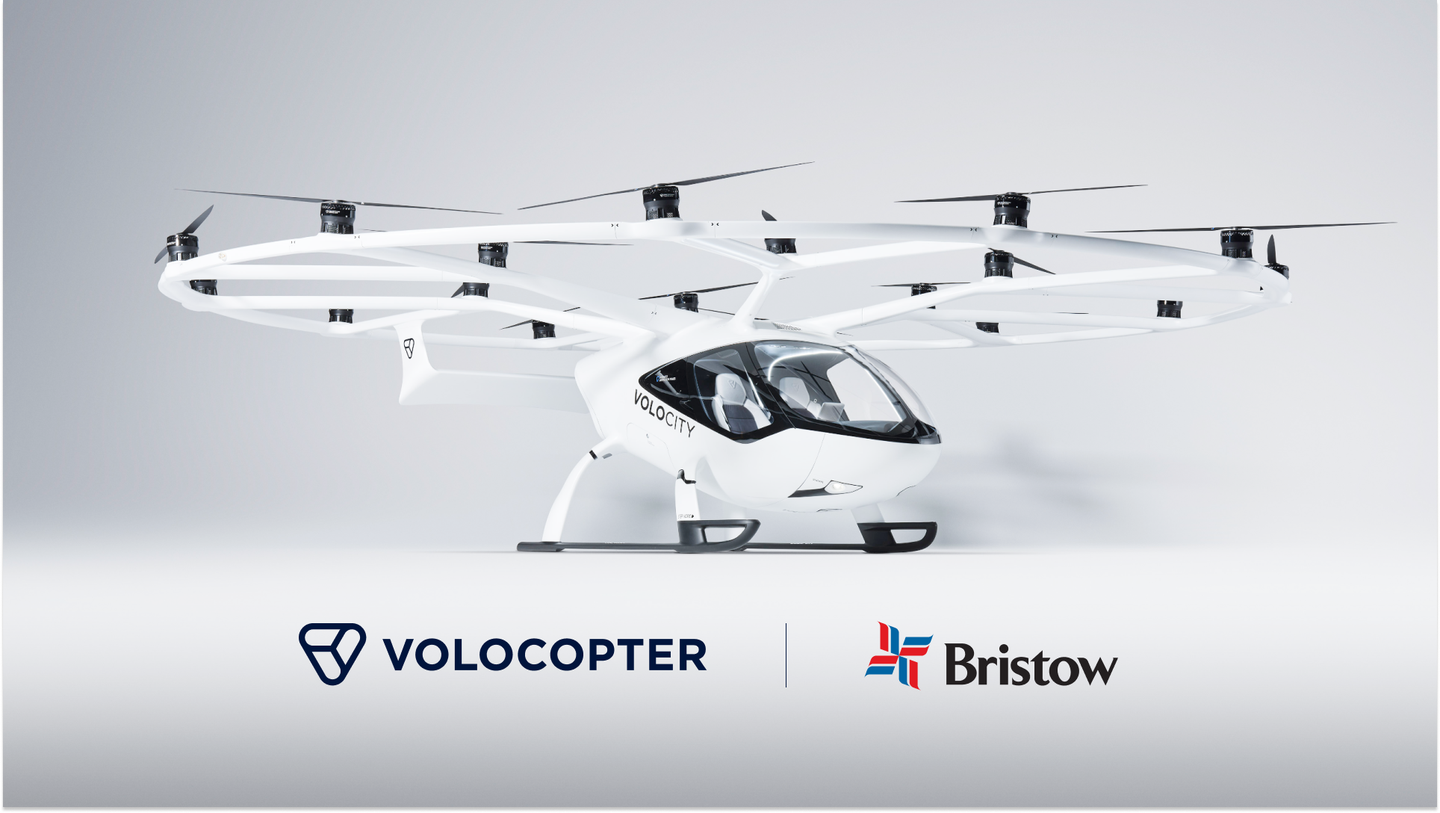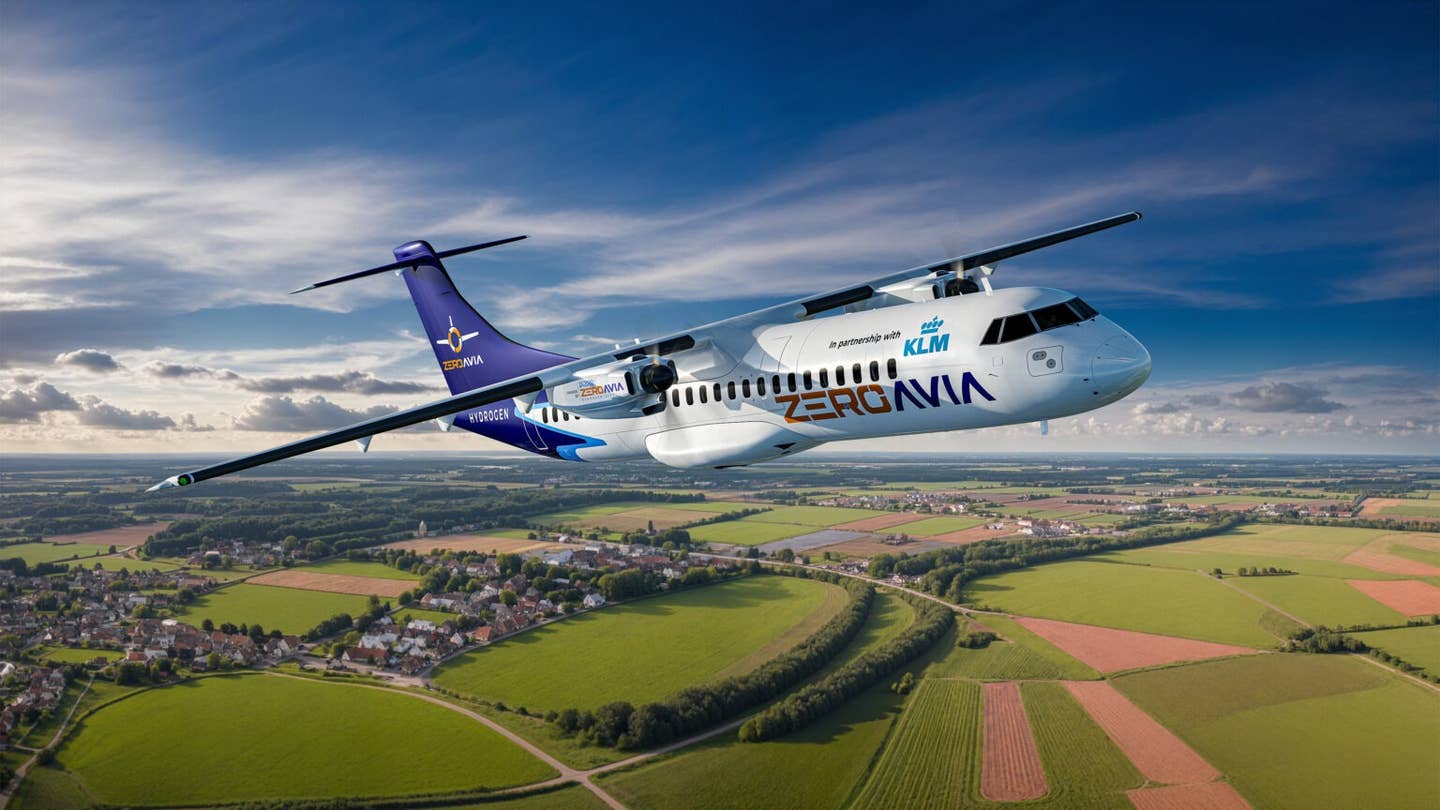Bristow to Bring Volocopter Air Taxis to U.S. Via New Partnership
Bristow agreed to buy two VoloCity eVTOLs—and help the German firm build a presence in the U.S. and U.K.

Bristow placed a firm order for two VoloCity eVTOL aircraft, with the option to acquire 78 more. [Courtesy: Volocopter]
The first commercial electric vertical takeoff and landing (eVTOL) air taxi flights will probably not be made by Joby Aviation, Archer Aviation, or Boeing’s Wisk Aero. In fact, they’re most likely to come from a firm with zero presence in the U.S. market—at least, not yet.
Volocopter, the German manufacturer that’s been a mainstay near the top of SMG Consulting’s Advanced Air Mobility (AAM) Reality Index, on Thursday announced a partnership with Houston-based Bristow Group that will bring the company’s VoloCity eVTOL to the U.S. and U.K. Bristow placed a firm order for two VoloCity with the option to acquire another 78, for a total of 80 aircraft.
The partnership will combine the vertical flight expertise of Bristow, which primarily operates helicopter services, with eVTOL aircraft from Volocopter as the partners develop an urban air mobility (UAM) ecosystem in the U.S. “Immediate cooperation” between the two firms will involve regulatory discussions, research on infrastructure requirements, and building local partnerships.
The joint development agreement also calls for the two to explore commercial, operational, and eVTOL aircraft maintenance services. It includes the adaptation of Volocopter’s proprietary digital platform, VoloIQ, which optimizes the allocation of batteries and other ground infrastructure, provides fleet service and management, automates routing and digital flight operations, and even connects users with cabs, scooters, and other ground transportation after they land.
Volocopter expects to receive European Union Aviation Safety Agency (EASA) type certification for VoloCity in 2024. A concurrent certification path with the FAA could allow it to begin operations in the U.S. shortly after. Prior to Thursday’s update, the company had not announced any services in the U.S. market.
“With this collaboration, Volocopter surpassed 500 pre-orders accumulated, including nearly 30 firm orders from reputational partners,” said Christian Bauer, CFO and CCO of Volocopter. “I am filled with excitement toward the vast potential of the U.S. and U.K. markets and looking forward to working with Bristow's experienced team as we prepare for operations.”
Bristow earlier this week placed deposits for early deliveries of five Elroy Air Chaparral cargo drones. The commitments add to the firm’s orders for up to 55 Beta Technologies Alia-250s, up to 50 Vertical Aerospace VA-X4s, 20 to 50 Overair Butterfly eVTOLs, 50 Lilium Jets, and 100 eVTOL aircraft from Embraer subsidiary Eve Air Mobility.
Bristow mainly flies helicopter services around the world, including in Australia, Africa, Latin America, the U.S., and the Caribbean. But the company is making it clear that other vertical-lift aircraft are in its crosshairs.
“Launching this collaborative effort with Volocopter marks a major milestone in Bristow's effort to usher in a new era of vertical transportation solutions,” said Dave Stepanek, executive vice president and chief transformation officer at Bristow. “Volocopter has taken a pragmatic approach to certification with a simple and elegant initial aircraft design and is leading the pack in its efforts to bring their aircraft to market.”
Volocopter, meanwhile, does not yet operate commercially. But it’s set to fly VoloCity over Paris at the 2024 Olympic Games through an agreement with international airport operator Groupe ADP, the French Civil Aviation Authority, and the Paris Region. The initiative is similar to the FAA’s Innovate28 plan for air taxi demonstrations at the 2028 Los Angeles Olympic Games. But it’s scheduled to take place a full Olympic cycle before the U.S. effort.
The company first unveiled its VoloCity design in 2019. Its two seats provide room only for a pilot and one passenger, but 18 rotors powered by nine lithium-ion battery packs give it a 440-pound payload, a 22 sm (19 nm) range, and a 68 mph (59 knots) cruise speed. Volocopter claims the design is four times quieter than a small helicopter.
VoloCity will be certified in the EASA special condition—VTOL (SC-VTOL) category. The company obtained design organization approval (DOA) in 2019, giving it permission to begin developing its design. It followed that up with a production organization approval (POA) in 2021, giving it the green light to begin producing its type-conforming aircraft.
Now, it’s seeking the coveted type certification which so far no eVTOL manufacturer has achieved. That would be a major step toward commercial operations. If the company doesn’t obtain type approval by 2024, it would need special permission from regional authorities to fly in Paris.
In January, Volocopter formed a new company and applied for an air operator certificate to fly commercial services with VoloCity. Normally, a company would first need to obtain type certification. But the firm has an agreement with regulators that has allowed it to pursue both in parallel. It’s serving as somewhat of a test case for authorities as they draw up AAM regulations.
The company also recently completed its Bruchsal, Germany production facility, noting that it received regulatory approval to manufacture 50 VoloCity aircraft per year there. In addition to Paris, Volocopter is looking to fly in Singapore and Rome in 2024, as well as in the planned city of Neom, Saudi Arabia as soon as construction allows. It just wrapped up the first eVTOL test flights in the country in June.
Looking a bit further out, the company is also developing the longer range VoloRegion model. It’s expected to connect cities and suburbs with UAM routes and first flew in 2022. The VoloDrone heavy-lift cargo drone is also in development.
Like this story? We think you'll also like the Future of FLYING newsletter sent every Thursday afternoon. Sign up now.

Subscribe to Our Newsletter
Get the latest FLYING stories delivered directly to your inbox






